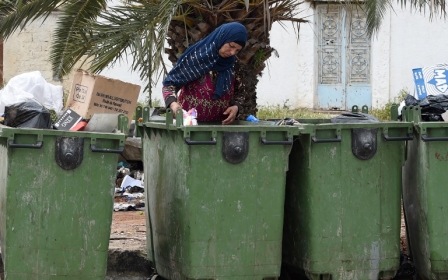An economic malaise lies at the heart of Libya-Tunisia border standoff

“We let go if you let go,” reads a banner hoisted a few miles from Ras Ajdir, one of the main border crossings between Tunisia and Libya.
It perfectly sums up a standoff that has shut the crossing in recent weeks. On one side, the crossing has been closed by Libyan authorities; on the other, the only road to the crossing has been barricaded by smugglers from the town of Ben Guerdane in southern Tunisia. Both sides have dug in, with Libya’s interior minister announcing it would continue the closure amid concerns about the security of Libyan travellers.
Meanwhile, Tunisian protesters have issued a set of demands, including the cancellation of the 30-dinar ($11) entry fee at the crossing and the acceleration of development projects in Ben Guerdane.
Vibrant border economy
Smuggling networks are the main employer in Tunisia’s southern borderlands, and every day that the border remains closed, there are significant losses for the thousands of local traders who usually cross it every day. So what has led to the current standoff?
At the heart of the conflict is an escalation of disagreements about how smuggling on the Libya-Tunisia border should be regulated. For decades, price differences, tariff evasion and subsidies have created a vibrant border economy, employing thousands and moving huge quantities of textiles, gasoline, food, cigarettes and electronics.
As Libya slips deeper into an economic crisis, cracking down on smuggling has risen higher on the agendas of local authorities and militias
The Ben Ali and Gaddafi regimes tolerated these activities as a cheap way to provide an income for otherwise economically marginalised populations, with plenty of opportunities to channel money to politically connected elites. Since 2011, the post-revolutionary governments have inherited these border economies, but they have so far lacked a unified vision on how to transform them. People in the borderlands have paid the cost.
On the Libyan side, frustrations have mounted in recent years, as some of the goods smuggled out of the country are subsidised in Libya, imposing a cost on the state. At the same time, the demand created by smuggling activities has driven up prices and created shortages in the Libyan borderlands.
Economic crisis
As Libya slips deeper into an economic crisis, cracking down on smuggling has risen higher on the agendas of local authorities and militias. Gasoline, in particular, has become contentious - and last year, amid increasing public outrage in western Libya, the informal agreements that regulate border smuggling started to limit quantities of gasoline. As a result, the price of the gasoline consumed by many in southern Tunisia has more than doubled.
At the same time, the fragmentation of authority in western Libya - and the significant commercial interests of some local groups in the smuggling economy - has made it difficult to foster robust solutions.
On the Tunisian side, the post-revolutionary state has largely continued to tolerate the smuggling economy on its southern border. Frequent promises of crackdowns, the occasional arrests of smugglers, and the creation of a largely inefficient “wall” along the Libya-Tunisia border has primarily been political theatre, aimed at both a domestic and international audience.
Successive administrations have understood the economic dependence of their southern borderlands on this trade, realising that a pure “law and order” approach could severely destabilise the region. At the same time, austerity politics and elite networks have made it difficult to build up investments and development projects as a genuine alternative to the smuggling economy.
The standoff at the Ras Ajdir crossing underscores the challenge that Tunisia and Libya face in renegotiating their relationship in a post-2011 world. Unfortunately, the border economies have put an extremely tight timeframe on this process; a series of crackdowns, border closures and roadblocks since 2014 have significantly tested the patience and resources of local communities.
Further escalation
In the absence of formal political channels with authorities in western Libya, the Tunisian state has largely relied on a set of local interlocutors - civil society activists, traders and local politicians - to reach across the border and try to prevent further escalation. They may succeed again and see the border reopened, with further restrictions on the smuggling of subsidised goods. But this is not a lasting solution.
There has been much talk about the risks that a destabilised and war-torn Libya holds for Tunisia’s security and economy. Yet, insufficient attention has been paid to the fact that a new, stable Libya may not tolerate the continuation of a large smuggling economy, triggering a serious destabilisation of southern Tunisia.
Going forward, there must be intensive political and economic re-engagement of the Tunisian state with its southern borderlands, focusing on the final point of the protesters’ list of demands: the creation of economic alternatives to the smuggling networks.
- Max Gallien is a PhD candidate in international development at the London School of Economics, specialising in the political economy of North Africa. He holds an MPhil in modern Middle Eastern studies from the University of Oxford, and was a scholar in residence at Al-Akhawayn University in Morocco. Twitter: @MaxGallien.
The views expressed in this article belong to the author and do not necessarily reflect the editorial policy of Middle East Eye.
Photo: Tunisian police stand guard at Ras Ajdir during an earlier closure of the border crossing in 2015 (AFP)
This article is available in French on Middle East Eye French edition.
Stay informed with MEE's newsletters
Sign up to get the latest alerts, insights and analysis, starting with Turkey Unpacked
Middle East Eye delivers independent and unrivalled coverage and analysis of the Middle East, North Africa and beyond. To learn more about republishing this content and the associated fees, please fill out this form. More about MEE can be found here.






